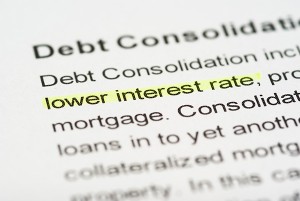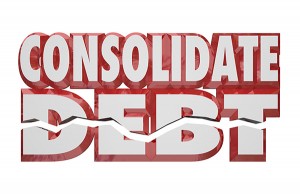Debt Consolidation
Debt consolidation allows a person to reduce the amount of money they have to pay each month. This can be done by either, making arrangements with the creditors or paying off the debt. By reducing the monthly payments, the consumer is able to manage their debts and free up some of their income.
Many Americans are living paycheck to paycheck. There is not money left over after paying bills and debts for saving or investing. When the economy took a fall, many people who lost their jobs, did not have a safety net.
Their accumulated debt, made it impossible for them, with reduced incomes to make payments. Even those who were able to keep their homes and property may have taken a hit to their credit scores because of late payments.

Types of Debt Consolidation
There are three main ways for a person to consolidate their debts. Each one offers a different type of service to the consumer.
1.Debt Consolidation Companies
Debt consolidation companies can help to negotiate with your creditors to lower your balance and reduce payments. They may be able to get some of the late fees removed and help to settle the account for less than is owed.
Debt consolidation companies will put you on a Debt Management Plan (DMP) or debt settlement or debt negotiation plan which will be based on your monthly income and expenses. This plan will help pay off your debts with some negative effects on your credit score.
2.Debt Consolidation Loans
A debt consolidation loan can be secured or unsecured. A secured loan needs collateral. An unsecured loan is based on your income, credit score and ability to pay.
Debt consolidation loans are offered by banks, credit unions and private lenders. Usually, the interest rates for the bank or credit union loans are lower. If you have a low credit rating, you may have trouble getting approved. If approved, you may need collateral or a co-signer.
3.Home Equity Loans for Debt Consolidation
If you own your home and have equity, you can apply for a home equity loan. In order to do this you need to have enough equity to cover the debts and good credit.
A home equity loan is a mortgage. You’ll need to prove creditworthiness and the ability to pay. The lender will look at your credit score, income, debt amounts, less what you’ll be paying off, the value of your home and how much you owe on your current mortgage.

The Benefits of Debt Consolidation
Debt consolidation can help a person manage their creditors and get back on their feet financially. This can help to keep them from losing their property to foreclosure or repossession and keep their credit rating from dropping due to late payments or charge-offs.
There are three major benefits to consolidating your debt:
1.Eliminate High Interest Debt
The average credit card interest rate is around 15 – 18 percent. If the majority of your debt is from credit or charge cards, then you may be paying a hefty sum of money in interest annually.
Car loans have an average interest rate of between one and seven percent. This can vary based on whether the car is new or used. It also depends on the length of the loan. A typical car loan is 36 months for a used car and 60 months for new.
Debt consolidation may be able to help you reduce these payments through negotiations. If you’re using a loan, then this debt would be paid off. As long as the loan’s interest rate is lower than what you’re paying, then you’ll save money.
2.Reduce Monthly Payments
Many people have hundreds of dollars of their monthly budget allocated for consumer debt, which does not include their mortgage. These payments can make a real dent in their budget and keep them from saving money.
Most credit cards have a minimum payment. This amount is due regardless of the balance. Many times this amount is just a little over the monthly interest. Because of this little is paid towards the principal balance.
Debt consolidation can reduce the monthly payment by paying off the debts with a loan. The new balance should be less, per month, than you’re paying now. If the consolidator is able to get the balance reduced, you’ll owe even less.
3.Improve Credit
When you’re having debt problems it can have an impact on your credit score. Credit reporting agencies look at your payment history when calculating your creditworthiness.
One of the first things that happen to many people when they’re having credit problems is that they have trouble making payments. Each late payment incurs a fee. Over time, the payments and the fees add up. This may make it more difficult for you to pay
Late payments are reported to the credit agencies. When you have a number of late payments. Or, if your payments start going over 30 days late, this could have a negative impact on your credit rating.
Conclusion: Should You Consolidate Your Debt?
Only you can decide if debt consolidation is right for you. However, you can’t do that until you have all of the facts. The only way to get that information is to contact a debt consolidator.
You may decide to fix your debt problem yourself. While this is an option, understand that many creditors will not negotiate with you. If this happens, then you may end up paying the full amount on all of your debts. This will make paying off your debt take longer.
Using a debt consolidator does not guarantee that your debt will be reduced. However, they will work hard to make sure you get the best deal possible. Their goal is to help you pay off your debt and hopefully save some money.
